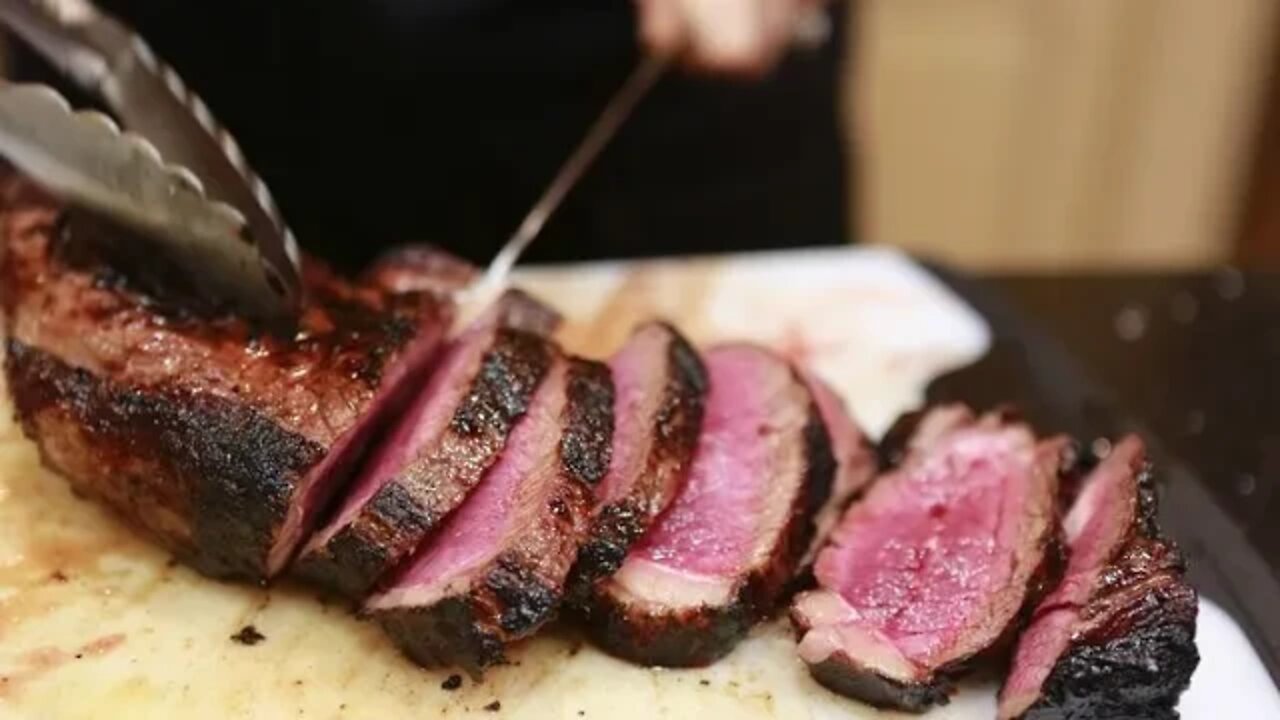Premium Only Content

Red Meat - Chicken - Salmon / FAQ
That's not blood coming from Your rare steak... White Striping on Chicken Breasts... And White Stuff Oozing Out From Your Salmon, Is It Safe?
Here's What That Blood In Your Meat Packaging Really Is...
Guess what? There's no blood in your rare steak either...
After learning what white striping on chicken breasts really means... yeah, it's pretty gross, we're relieved to discover that the answer to life's other big raw meat mystery is less nausea-inducing...
When purchasing red meat, including steaks, many grocery shoppers often find red liquid in the bottom of the packaging, which you probably assumed was blood. It turns out, it's not actually blood, but rather a protein called myoglobin, according to Buzzfeed. The protein is what gives the meat and its juices a red hue, and it's perfectly normal to find in packaging.
Similar to the hemoglobin found in our blood, myoglobin carries oxygen to the animal's muscles, according to the New York Times. The protein changes color when it's exposed to air and heat, which is why your meat transforms from red to brown when it's cooked or sits in packaging for too long.
What's more, the red juice that oozes from your medium-rare steak isn't blood either... It's the same protein found at the bottom of your packaging, according to The Huffington Post. Rare steaks and burgers aren't exposed to heat for as long as well-done meats, causing more red myoglobin to be present. So the next time someone gawks at your rare and juicy sirloin steak, you can tell them to relax... it's just protein!
Okay, Let's get back to white striping on chicken breasts...
This Is What the White Striping on Your Chicken Breast Really Means... Fair warning... This may make you a little queasy.
An animal activist group wants you to think twice before chowing down on that grilled chicken sandwich. A new video by Compassion in World Farming is urging meat-lovers to learn about white striping, a muscle disorder affecting chicken breasts. According to a 2013 study published in the Italian Journal of Animal Science, the condition ups fat content by 224% and lowers the amount of protein. Research published in Poultry Science the same year came to a similar conclusion: Fat increased and muscle decreased based on the amount of white striping.
You might have noticed white striping in your meat aisle already. The condition looks like white striations running parallel to the regular muscle. According to a 2016 study by the University of Arkansas and Texas A&M, "the severity of white striping has increased in recent years," identifying it in 96% of the 285 birds they tested. More importantly, the condition "negatively impacts meat quality" by affecting marinade uptake and cook loss.
The poultry scientists believe that a simple case of supply and demand is at play: The average American eats over 90 pounds of chicken every year, and that number is only going up. The market for cheap protein encourages farmers to produce bigger birds in less time. According to the National Chicken Council, the average bird sent to market in 1950 was 3.08 pounds and 70-days-old. In 2015, the average weight had doubled... clocking in at 6.24 pounds... but the average age dipped to 47-days-old.
However, a spokesman for the National Chicken Council told Buzzfeed white striping affects only a small percentage of chicken meat, and does not create any health or food safety concerns for people.
Jaclyn London R-D... Nutrition Director at the Good Housekeeping Institute agrees that chicken is still a healthy choice. Chicken... so long as it's not breaded and deep-fried... is a great source of lean protein that also happens to be rich in B-vitamins, iron, and vitamin B12 she says. Look for labels with a No Antibiotics Ever seal... remember to properly cook, store and keep poultry at correct temperatures in the fridge or freezer; and avoid cross-contamination during meal prep.
Whew... that's good news, especially with Football Sunday coming up. Now bring on the BBQ chicken. Up Next... Is It Safe To Eat The White Stuff Oozing From Cooked Salmon? Nope, it's not fat. You just dropped 30 dollars on a beautiful piece of salmon and after you throw it on the grill, or slide it into the oven, a weird white substance starts oozing from the filet. What the heck?!
So what is this white substance? Can you eat it? Is it safe? Relax... the stuff sweating out of your salmon is completely harmless.
Translated titles:
Carne roja-Pollo-Salmón / Preguntas frecuentes
Carne Vermelha-Frango-Salmão / FAQ
紅肉-雞肉-三文魚 / 常見問題
Pulang Karne-Manok-Salmon / FAQ
Daging Merah-Ayam-Salmon / FAQ
赤身の肉-鶏肉-サーモン/ FAQ
붉은 고기-닭고기-연어 / FAQ
ຊີ້ນແດງ-ໄກ່-ປາແຊນມອນ / FAQ
เนื้อแดง-ไก่-แซลมอน / คำถามที่พบบ่อย
Thịt đỏ-Gà-Cá hồi / FAQ
-
 34:26
34:26
Misfits Mania
7 hours ago $13.09 earnedMISFITS MANIA: Launch Press Conference
138K19 -
 33:29
33:29
Donald Trump Jr.
6 hours agoLive With FBI Director Kash Patel, Breaking News!! | Triggered Ep.297
224K180 -
 1:22:59
1:22:59
The Quartering
3 hours agoJ6 Pipe Bomber Arrested, Candace Owens TPUSA Debate Predictions & My Staff Caused A Lawsuit!
93.4K53 -
 LIVE
LIVE
Dr Disrespect
7 hours ago🔴LIVE - DR DISRESPECT - WARZONE x BLACK OPS 7 - SEASON 1 INTEGRATION
1,269 watching -
 26:36
26:36
Jasmin Laine
2 hours agoTrump SILENCES Liberal Canada—CEO’s Oval Office Bombshell STUNS Ottawa
4.95K6 -
 27:03
27:03
The Kevin Trudeau Show Limitless
1 day agoThey're Not Hiding Aliens. They're Hiding This.
20.7K30 -
 LIVE
LIVE
LFA TV
20 hours agoLIVE & BREAKING NEWS! | THURSDAY 12/04/25
1,132 watching -
 LIVE
LIVE
The HotSeat With Todd Spears
2 hours agoEP 220: Candace Vs. TPUSA (and Why I DON'T CARE)
239 watching -

DeVory Darkins
5 hours agoBOMBSHELL: Congress drops BRUTAL NEWS for Tim Walz after Comer announces Probe
196K57 -
 1:15:17
1:15:17
Sean Unpaved
6 hours agoPlayoff Implications On The Line For Cowboys vs. Lions NFC SHOWDOWN! | UNPAVED
65.8K